
Brazil, officially the Federative Republic of Brazil, is the largest and easternmost country in South America and in Latin America. Brazil is the world's fifth-largest country by area and the seventh most populous. Its capital is Brasília, and its most populous city is São Paulo. The federation is composed of the union of the 26 states and the Federal District. It is the only country in the Americas to have Portuguese as an official language. Brazil is one of the most multicultural and ethnically diverse nations, due to over a century of mass immigration from around the world.

The German diaspora consists of German people and their descendants who live outside of Germany. The term is used in particular to refer to the aspects of migration of German speakers from Central Europe to different countries around the world. This definition describes the "German" term as a sociolinguistic group as opposed to the national one since the emigrant groups came from different regions with diverse cultural practices and different varieties of German. For instance, the Alsatians and Hessians were often simply called "Germans" once they set foot in their new homelands.

Brazilian cuisine is the set of cooking practices and traditions of Brazil, and is characterized by European, Amerindian, African, and Asian influences. It varies greatly by region, reflecting the country's mix of native and immigrant populations, and its continental size as well. This has created a national cuisine marked by the preservation of regional differences.
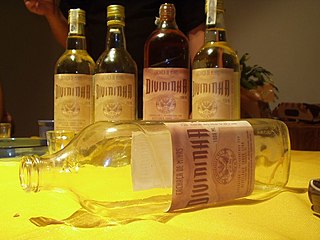
Cachaça is a distilled spirit made from fermented sugarcane juice. Also known as pinga, caninha, and other names, it is the most popular spirit among distilled alcoholic beverages in Brazil. Outside Brazil, cachaça is used almost exclusively as an ingredient in tropical drinks, with the caipirinha being the most famous cocktail. In Brazil, caipirinha is often paired with the dish feijoada.

São Paulo is the most populous city in Brazil and the capital of the state of São Paulo. Listed by the GaWC as an alpha global city, São Paulo is the most populous city outside of Asia and the world's 20th-largest city proper by population. Additionally, São Paulo is the largest Portuguese-speaking city in the world. It exerts strong international influences in commerce, finance, arts, and entertainment. The city's name honors the Apostle, Saint Paul of Tarsus. The city's metropolitan area, the Greater São Paulo, ranks as the most populous in Brazil and the 12th-most-populous on Earth. The process of conurbation between the metropolitan areas around the Greater São Paulo created the São Paulo Macrometropolis, a megalopolis with more than 30 million inhabitants, one of the most populous urban agglomerations in the world.

Curitiba is the capital and largest city in the state of Paraná in Southern Brazil. The city's population was 1,963,726 as of 2021, making it the eighth most populous city in Brazil and the largest in Brazil's South Region. The Curitiba Metropolitan area comprises 29 municipalities with a total population of over 3,731,769, making it the ninth most populous metropolitan area in the country.
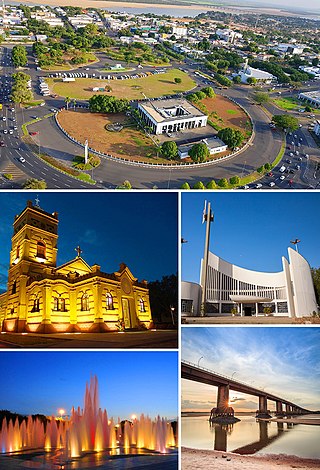
Boa Vista is the capital of the Brazilian state of Roraima. Situated on the western bank of the Branco River, the city lies 220 km (140 mi) from Brazil's border with Venezuela. It is the only Brazilian state capital located entirely north of the equator.

Japanese Brazilians are Brazilian citizens who are nationals or naturals of Japanese ancestry or Japanese immigrants living in Brazil or Japanese people of Brazilian ancestry.

German Brazilians refers to Brazilians of full or partial German ancestry. German Brazilians live mostly in the country's South Region, with a smaller but still significant percentage living in the Southeast Region.
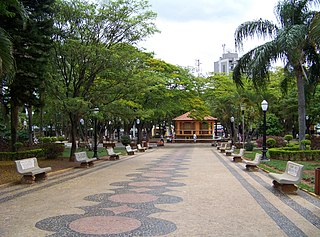
Pirassununga is a municipality in the state of São Paulo in Brazil, with an altitude of 627 meters. The population is 76,877 in an area of 727 km2.
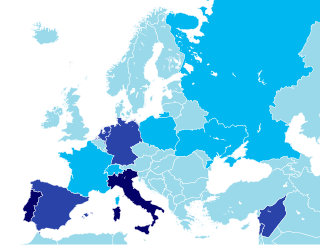
Immigration to Brazil is the movement to Brazil of foreign peoples to reside permanently. It should not be confused with the forcible bringing of people from Africa as slaves. Latin Europe accounted for four-fifths of the arrivals. This engendered a strikingly multicultural society. Yet over a few generations, Brazil absorbed these new populations in a manner that resembles the experience of the rest of the New World.

Joinville is the largest city in Santa Catarina, in the Southern Region of Brazil. It is the third largest municipality in the southern region of Brazil, after the much larger state capitals of Curitiba and Porto Alegre. Joinville is also a major industrial, financial and commerce center.

White Brazilians refers to Brazilian citizens who are considered or self-identify as "white", typically because of European ancestry, or Levantine ancestry from Lebanon and Syria.
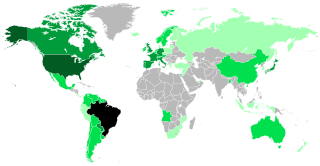
Brazilians are the citizens of Brazil. A Brazilian can also be a person born abroad to a Brazilian parent or legal guardian as well as a person who acquired Brazilian citizenship. Brazil is a multiethnic society, which means that it is home to people of many ethnic origins, and there is no correlation between one's stock and their Brazilian identity.
There is a significant community of Brazilians in Japan, consisting largely but not exclusively of Brazilians of Japanese descent. Brazilians with Japanese descent are known as Nikkei Brazilians. They constitute the largest number of native Portuguese speakers in Asia, greater than those of formerly Portuguese East Timor, Macao and Goa combined. Likewise, Brazil maintains its status as home to the largest Japanese community outside Japan.

Russian Brazilians are Brazilian citizens of full or partial Russian ethnic background or Russian-born people residing in Brazil. The term can also refer to someone with a Brazilian mother and Russian father, or vice versa.

Brazil had an official resident population of 203 million in 2022, according to IBGE. Brazil is the seventh most populous country in the world, and the second most populous in the Americas and Western Hemisphere.
Siderópolis is a municipality in the state of Santa Catarina in the South region of Brazil.
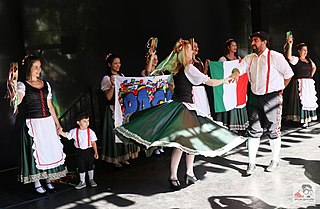
Italian Brazilians are Brazilians of full or partial Italian descent, whose ancestors were Italians who emigrated to Brazil during the Italian diaspora, or more recent Italian-born people who've settled in Brazil. Italian Brazilians are the largest number of people with full or partial Italian ancestry outside Italy, with São Paulo being the most populous city with Italian ancestry in the world. Nowadays, it is possible to find millions of descendants of Italians, from the southeastern state of Minas Gerais to the southernmost state of Rio Grande do Sul, with the majority living in São Paulo state. Small southern Brazilian towns, such as Nova Veneza, have as much as 95% of their population of Italian descent.
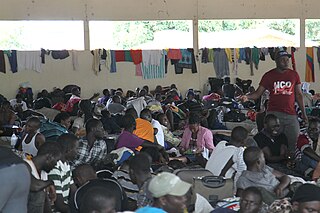
A Haitian Brazilian is a Brazilian person of full, partial, or predominantly Haitian ancestry, or a Haitian-born person residing in Brazil.



















